Iran's Parliament Speaker Says Embezzlement Goes Against Jihad
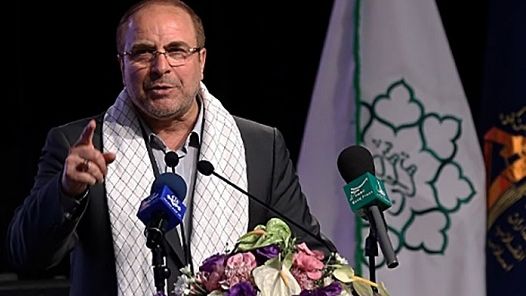
Amid denials of embezzlement allegations, Iran's Parliament Speaker claimed corruption goes against his Islamic principles.

Amid denials of embezzlement allegations, Iran's Parliament Speaker claimed corruption goes against his Islamic principles.
"Can anyone claim to embrace the culture of jihad and martyrdom while being a thief and embezzler?" Mohammad-Bagher Ghalibaf questioned, defending himself against ongoing accusations.
The controversy surrounding Ghalibaf deepened with the resurfacing of a leaked audio tape from February 2022. The tape revealed discussions between top Revolutionary Guard generals regarding a major corruption scandal, implicating Ghalibaf during his tenure as Tehran's mayor.
The discussion captured in the recording implicated Ghalibaf, former Qods Force Commander Qasem Soleimani, IRGC Coordination Deputy Jamaloddin Aberoumand, and Chief of the IRGC Intelligence Organization Hossein Taeb in attempts to conceal the embezzlement of 80,000 billion rials (approximately $3 billion at the time) between Tehran municipality and a firm controlled by the IRGC.
The funds, primarily allocated for Qods Force activities, mysteriously vanished during transactions between the municipality and Yas Holding, a subsidiary of the IRGC's Cooperatives Foundation engaged in various sectors, including services, dealership, and housing subcontracting.
Yas Holding faced official dissolution in 2018, merely two years after its inception, following the arrest of several officials. Among the four individuals charged, including Ghalibaf's deputy in the Tehran municipality, Isa Sharifi, all were convicted, handed lengthy prison sentences, and ordered to return a portion of the substantial sums they embezzled.
Despite previous accusations of financial misconduct, Ghalibaf has managed to evade investigation, leading to speculation about his close ties to Supreme Leader Ali Khamenei.
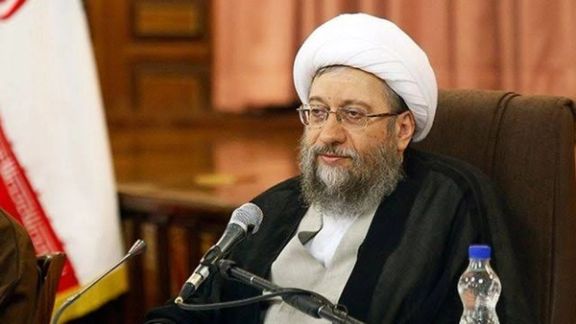
In a candid admission, the head of Iran's Expediency Council addressed the pressing economic issues faced by a significant portion of the population during a speech on Wednesday.
Sadegh Amoli Larijani attributed the challenges to rampant inflation and a surge in prices, underscoring the strain on citizens, partly attributing it to inadequacies in official measures. Global sanctions have had a huge impact on the economy, first imposed due to Iran's nuclear program and more recently, for its crackdown on protesters and support for Russia in its war on Ukraine.
Downplaying the economic disaster which has seen millions thrust into poverty, Larijiani said, "There are issues in the country, but it should be noted that if there is authority and security in the Islamic Republic system, the economic situation will also improve".
However, concerns about security persist in Iran, as officials grapple to provide adequate protection. Earlier this month, a commemoration ceremony for the former IRGC commander Qassem Soleimani in Kerman resulted in the death of at least 95 people after a double bombing by ISIS, highlighting the ongoing challenges faced by Iranian authorities in maintaining public safety.
A recent report indicates that the impact of inflation is more severe than officially acknowledged. The Fararu website in Tehran revealed that the point-to-point inflation rate in December exceeded 40%, surpassing the average figure announced by authorities. The index suggests that Iranian households spent approximately 40% more in the past month compared to the same period in the previous year to fulfill their needs and purchase essential goods and services.
According to the Iran Statistical Center's definition, the point-to-point inflation rate represents the percentage change in the average of the price indices compared to the previous year, providing a more tangible perspective on understanding price hikes. The reported point-to-point rate for the past month stood at 44.4%, surpassing the government's predicted annual rate of 25% for the current Iranian year, which began on March 21.
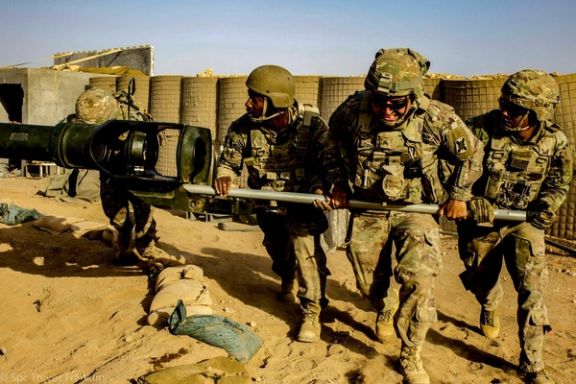
The Pentagon has denied media reports that the Biden administration may be considering a full withdrawal of American troops from Syria in 2024.
A report in Foreign Policy Wednesday suggested that “the White House is no longer invested in sustaining a mission that it perceives as unnecessary,” quoting “four sources within the Defense and State departments”.
But a Pentagon spokesperson has called the report “erroneous,” according to the Russian RIA Novosty, which had submitted a query to the US Department of Defense.
A withdrawal would be a gift to Iran and its affiliated groups in Iraq and Syria, who have been launching attacks on US forces with the exact same goal. A similar likelihood exists in Iraq, where pro-Iranian groups dominating the parliament have been demanding the withdrawal of US and coalition forces.
The issue is far from clear however.
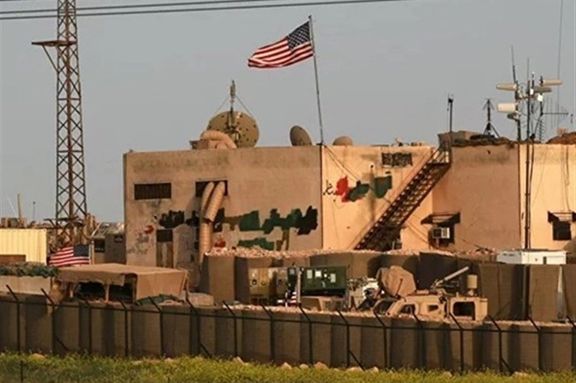
Charles Lister, director of the Syria and Counterterrorism and Extremism programs at the Middle East Institute, who has penned the FP report admits that “no definitive decision has been made” within policy circles of the Biden administration.
Senior, well-placed reporters and observers like Alex Ward of Politico and Aaron Y. Zellin of the Washington Institute have posted conflicting opinions on the matter, both quoting unnamed US officials denying the report.
“I'm actually encouraged to see the White House and Department of Defense come out so quickly to deny,” Lister wrote on X, commenting on rejections of his FP report, “it shows the kind of sensitivity that normally exists only when the claim is true.”
Earlier in the week, reports emerged of a US national security meeting to discuss a plan to urge the Kurdish forces in Syria to partner with the Assad regime against ISIS. Such a plan, if true, would be in line (or complement) any withdrawal plan –to address the vacuum created by the likely absence of American troops.
The Pentagon was quick to deny the report, however, according to CNN, claiming that there was “no intention” to support a partnership between Assad and the Kurds.
But Amberin Zaman –who had broken the report for AlMonitor– hit back with more details to back up her original story.
“An interagency policy committee meeting to explore the idea was held on Jan. 18,” she posted on X. “Are they denying that the sub IPC where the subject was raised as per my admin sources took place?”
Policy circles do look at various scenarios and it would be far from surprising for them to study an eventual withdrawal of US forces from Syria. To ‘consider’ it in a US election year, and in the middle of an ongoing crisis in the region, however, would be a different story altogether.
Since October last year, armed groups backed by Iran have launched more than 150 attacks against American forces in Syria and Iraq. The attacks are said to be in support of Palestinians in Gaza who have been enduring an Israeli onslaught for more than 100 days –following Hamas rampage of border areas inside Israel on 7 October.
That may very well be true –in the short term. The long game, however, has always been to “kick the Americans out of the region,” as stated in clearest terms by many Iranian officials.
It’s hard to draw conclusions from what has been reported so far. But it’s not that hard to imagine the Biden administration contemplating a withdrawal, taking into account its track record in the Middle East, in general, and its Iran policy, in particular. Critics have pointed out the lack of a coherent policy and an eagerness to appease Iran and avoid escalation regardless of Tehran's actions.
A complete pullout of American troops from Syria may be farther away than suggested in the Foreign Policy report. Any such report, however, even if rejected by US officials as has been this one, would be music to the Ayatollah’s ears.
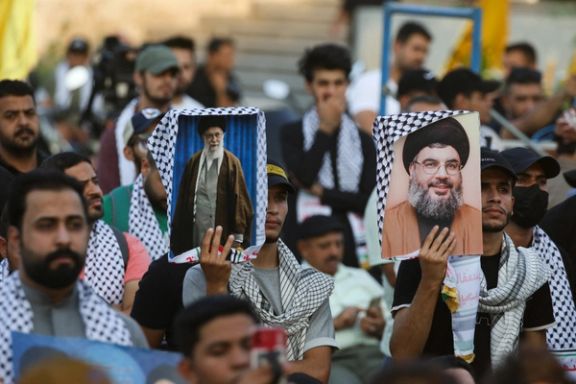
The Iraqi prime minister's office warned that US strikes on Iran-backed proxies on Tuesday would lead to an "irresponsible escalation".
In a statement issued on Wednesday, the Iraqi government expressed its disapproval, deeming the operations as "aggressive actions" that undermine years of cooperation between the two nations.
"These precision strikes are in direct response to a series of escalatory attacks against US and Coalition personnel in Iraq and Syria by Iranian-sponsored militias," US Defense Secretary Lloyd Austin said in a statement.
It came as a rare response to attacks by Iran-backed Kataib Hezbollah which has been carrying out strikes on US facilities in Iraq since the war in Gaza broke out, in response to US support of Israel's retaliation following the Iran-backed Hamas invasion on October 7.
Since the war broke out, over 150 attacks on US troops in Iraq and Syria have been carried out by Iran-aligned militants.
In spite of the retaliation, Kataib Hezbollah's military spokesperson, Jaafar al-Husseini, vowed to persist in targeting "enemy bases" until the end of Israel's bombardment in Gaza, a response to Hamas attacks which killed at least 1,200 mostly civilians in a single day and saw 250 or more taken hostage to Gaza.
On Wednesday, an armed drone reportedly targeted a base housing US forces near Erbil airport in northern Iraq, according to Reuters sources. Details of the incident have yet to be released.
While Iran has refrained from direct military involvement in the Gaza war to avert a confrontation with Israel and the US, its proxy forces in the Middle East have actively targeted US and Israeli interests, along with international shipping in the Red Sea.
Presently, the US maintains 900 troops in Syria and 2,500 in Iraq, working to advise and assist local forces in preventing the resurgence of the Islamic State, which seized substantial territories in both countries in 2014 before being defeated.
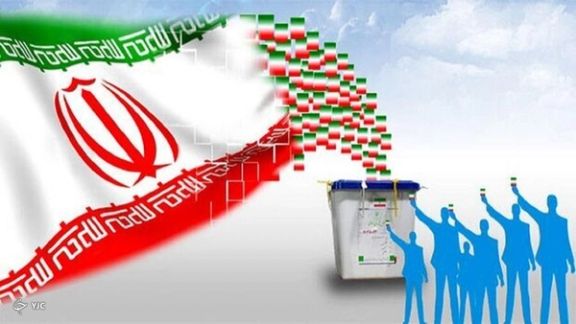
Iran's state television has announced a controversial plan to allow the parliamentary election candidates to place campaign ads on TV for hefty amounts of cash.
The March 1 election is strictly limited to ultraconservative candidates with minimal participation from other conservatives. Reformist and moderate candidates are effectively barred from running. Voter turnout is also expected to be extremely low, partly due to what former President Hassan Rouhani has called “meaningless elections.”
The state television (IRIB) is strictly under the control of Supreme Leader Ali Khamenei’s office and is the sole broadcaster in Iran.
The advertising plan which calls for up to 1,5 billion rials ($3,000) per advertisement has been widely criticized by candidates, journalists, politicians, and members of the public, as biased, unlawful and impractical. Although this can be considered a modest amount of money in other countries, in case of Iran the average employee makes a little over $200 per month.
Some have also accused IRIB managers of being greedy and wanting to accumulate cash to add to their hefty annual budget from the government, a huge advertising revenue, and ad hoc handouts in foreign currency from the National Development Fund.
Previously, limited candidate ads were allowed for presidential campaigns but the practice never applied to parliamentary elections.
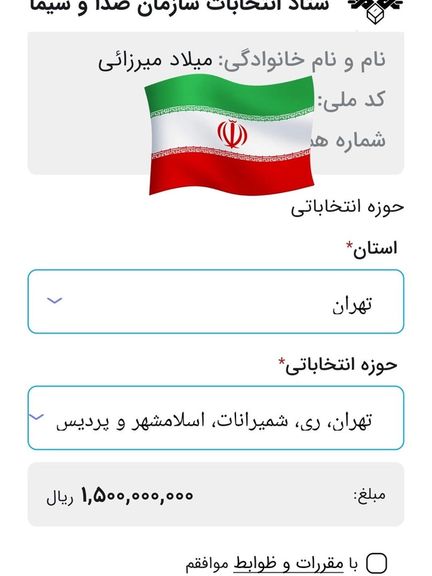
Meanwhile, according to Etemad newspaper in Tehran, based on nine different polls conducted between 2014 and 2021, IRIB's viewership has been constantly falling. In all, the broadcaster has lost over 45 percent of its viewers during seven years, due to dull programming and highly biased reporting.
According to Etemad, the latest amendment of the election law prohibits advertising election campaigns on homegrown and foreign social media and generally on the Internet.
On the other hand, IRIB Chief, Payman Jebelli, has told the Iranian government that it has prepared for launching 200 election campaign channels and will sell airtime to candidates.
Although advertising on some of Iran's Tv channels including Channel 3, which broadcasts entertainment and sports programs, and the Sports Channel which broadcasts popular athletic events, might make sense at certain times, channels dedicated to election are meaningless for viewers as interest in political activity has dropped to under 20 percent of eligible voters in Tehran as a result of people's dissatisfaction with the government's performance and their grievances about the harsh treatment of protesters in recent years.
Advertisers in Iran generally know that the best time for airing ads is before and after football (soccer) matches and major TV serials. It is reasonable to believe that the only people interested in the election campaign channels' output are likely to be the candidates, their campaign managers and a very limited number of general viewers.
On the other hand, many candidates including two of IRIB's own employees, Amir Hossein Sabeti and Mohamad Reza Ranjbaran have complained about the IRIB's pricing of advertising for candidates. As regular employees, the advertising fee is an astronomical figure for them.
Ranjbaran wrote that the IRIB is set to make around 4.2 trillion rials out of advertising for Tehran candidates alone. Sabeti wrote a letter to the IRIB Chief and published it in a series of 8 tweets against the advertising plan. In the letter, Sabeti accused the IRIB of capitalism and said it was unbelievable for him that the broadcaster demands such hefty figures for election campaigning.
Like many other social media users, Sabeti wrote that the plan was unfair as those who have money can campaign and those who do not have enough funds cannot.
In other posts on Twitter, Iranian journalist Ehsan Rastegar accused IRIB managers of profiteering and Hesamoddin Ashna, an adviser to Former President Hassan Rouhani who represented the Executive Branch of the government at the IRIB Supervisory Board from 2013 to 2021 questioned the legal basis of the pricing.
IRIB later announced that it has lowered advertising rates particularly for candidates from small towns, but rates in the capital, Tehran, seem unchanged.
Regardless of the ongoing controversy, it remains unclear how many minutes of advertising is covered by the rate charged, the format of the advertisements, the specific time slots, and frequency of airing. Etemad claims that the fee covers the airing of a 20-minute video that presents the candidates' backgrounds, plans and perspectives. However, it's worth noting that the video will undergo a review (including potential censorship) before being broadcast.

A panel of United Nations experts strongly criticized the execution of Mohammad Ghobadlou, a 23-year-old protester with a long-term psychosocial disability.
The experts including Javaid Rehman, Special Rapporteur on the situation of human rights in the Islamic Republic of Iran; and Morris Tidball-Binz, Special Rapporteur on extrajudicial, summary or arbitrary executions called on Iran to uphold its commitments under international human rights law.
“We are alarmed by reports of unfair trial proceedings in the case of Mr Ghobadlou, as well as in other cases, which fell far short of due process and fair trial standards required by international human rights law by which Iran is bound,” the UN experts said.
Ghobadlou, arrested on September 22, 2022, in connection with nationwide protests faced accusations of killing an Iranian official in Robat Karim, Tehran Province, and was sentenced to death on charges of "corruption on earth."
“We are shocked that the authorities went ahead with the execution despite the fact that Mr Ghobadlou and his lawyer had no information about the legal basis for the intended execution,” the experts said.
Additionally, they identified at least four individuals, including Mojahed (Abbas) Kourkour and Reza (Gholamreza) Rasaei, reportedly at imminent risk of execution, with at least 15 others facing the death penalty.
Concerned about the spike in executions, the experts disclosed that at least 834 people were executed in Iran in 2023, including 8 associated with the nationwide protests. They urgently called on the Iranian government to halt the ongoing wave of executions and reassess the use of the death penalty.